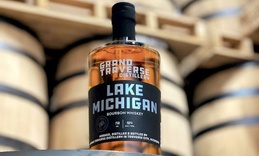Less Jail, More Treatment
Dec. 21, 2014

Retiring "˜Sobriety Court’ judge transformed how drunk drivers pay
Much has changed for northern Michigan drunk drivers since the 1990s, because the 86th District Court -- covering Antrim, Grand Traverse and Leelanau counties -- was among the first in Michigan to establish a Sobriety Court, a "problem-solving court" that lets defendants spend less time in jail in exchange for more intrusive supervision of their lives.
Judge Michael Haley, who took office in 1996, started Sobriety Court in Traverse City in 2001.
This January, he will retire. The Express sat down with Haley to talk drunk driving, retirement, and where he expects "problem-solving courts" to go in the future.
Northern Express: How different is the experience for drunk drivers in court today compared to what happened in the 1990s?
Michael Haley: It’s upside down. It’s a hundred and eighty degrees. When I started, the usual scenario for drunk driving cases was, first time, we had kind of a set pattern of what the sentence was going to be. Usually no jail. Six months of probation or something like that. And they get a little alcohol education class, so called, and then they’re gone. The second time was treated slightly differently but not much. Jail time was 15 to 45 days, probably with a community corrections early release, a little longer probation, and while the person was on probation, if there was a violation, it was almost always for a positive breath test or a probation officer saw somebody in a bar, the person would be dragged in, the probation terminated, and a whole bunch of jail time. That was our response to repeat offense drunk driving. It always seemed pointless to me.
Express: Because the person was only going to get out of jail and go drink.
Haley: Yeah. You’re not going to cure them by doing that. Intellectually, I knew that I wasn’t being really effective. But then when I would see, even in the first couple of years I was here, the same people coming back within a year or two, I really realized how ineffective I was as a judge and how pointless the whole exercise was. I really thought about going back to practicing law.
Express: But you established "˜Sobriety Court’ instead.
Haley: Fast forward – I went to this conference in 2000, 2001, and when I saw this thing, when I saw the model, it was just transformative. I saw it and I don’t know how to compare it to anything. I saw it and my eyes were just totally opened. I could see immediately that this was a program that would have to work, and even if it didn’t work, it would be so much better than the present system.
Express: What happens to drunk drivers who come through the system today?
Haley: How is it different now? Things are totally different now, because the individual that we see at arraignment, who is a repeat offense drunk driver, those people are treated totally differently. They are first of all given rigorous bond conditions, right off the bat. Without knowing it, they’re already starting, with the testing twice a day and weekly random urines and no bars and casinos and we start them with that right away. We get them a substance abuse assessment the day they come in for arraignment, and they might not be thinking about treatment or stopping alcohol use or whatever other drugs they’ve got going, they may be in what the psychologists call "˜the precontemplative stage.’ Somebody told them they should stop drinking, but they’re really not thinking about it too much. So we deal with them where they’re at. At arraignment, we provide to them lots of material for them to be thinking about whether they ought to be making changes. The bottom line is that we’re looking at a repeat offender at arraignment as somebody who might want to make a change, rather than, how much time am I going to give this guy?
Express: We hear complaints about how onerous the process is. Some say they get buried in the costs – the twice-daily breath tests, the car interlock system, court costs and fines. Some feel like the system is set up for them to fail.
Haley: Let’s look at the financial burden. First of all, almost none of them pay for any treatment. That’s either Medicaid or their own health insurance. So they’re usually not outof-pocket for any treatment. The biggest cost is getting to places. It’s a time management thing and also paying for the gas to get to the treatment places. AA meetings don’t cost anything. The biggest cost is testing, I think. That is real money out of their pocket. If you live in Kingsley, and you’ve got to test twice a day on Eighth Street, you know, do the math with the miles per gallon and the cost of gas. That’s a lot of money. But sometimes, I’ll ask some people, "˜You know, how much does a pint cost you? Or a fifth?’ Because some of these people are drinking a pint of alcohol or a fifth of alcohol a day, and that’s got to cost some money.
Express: Are there people who drop out because they can’t afford the program?
Haley: There are people who claim it’s too much. "˜It’s too much of a burden.’ "˜I can’t do it.’ "˜I don’t want to get involved in it right up front.’ But we’ve never bounced somebody for financial reasons; somebody who gets halfway through the program and says, "˜Oh, my god, it’s too much money.’ That doesn’t happen. We’ll find the money. There’s money out there for testing and we can help them find it. More typically will be the case, I remember a young person, just by way of anecdote, who just said, "˜I can’t .’ I mean, she’s the one truthful person I think who just wanted to bail, and she said, "˜I just want to feel normal again.’ I can appreciate it, you know, it was too early for her. "˜You’re 20-whatever, you know, you’re too early for this. Have at it. Party on.’
Express: So she went from Sobriety Court to jail?
Haley: Yeah.
Express. How effective do you think jail is at correcting people’s behavior?
Haley: It’s great for about 72 hours. And then after about 72 hours, the effectiveness drops right off a cliff. The people that run the jail, they’ll tell you, "˜Yeah, after a couple, three or four days, five days at the most, the effectiveness goes down.’ In fact, any decent study will confirm that the longer a jail term, the more likely a person is going to offend again. So there’s a correlation between the length of time and the recidivism rate.
Express: Is that because people become acclimated to being in a jail and they’re no longer afraid of it?
Haley: Could be. I mean human beings can adapt to just about anything. I don’t know enough about it psychologically. I just know that’s the way it is. I think there’s resentment that builds up, too. You’ve got a lot of time in the jail to think about why you’re there and who to blame for that. But what we try to do with Sobriety Court is – people do go to jail while they are in Sobriety Court, but they will go for a night or they’ll go for two nights or three nights. So the extreme case, where a person has violated so many times where we violate their probation and keep them in jail for a week, that’s when something drastic is going to happen. At the end of that week, they are either done and we send them, usually it’s a felony and we send them over to circuit court for their sentencing, or we spring them that day and get them into a treatment program.
Express: What success stories stick out?
Haley: I don’t know where to start. Here’s one: this gentleman came in, we’ll call him Joe. Joe’s from out by Grawn. He’d been convicted of drunk driving four or five times. This guy came into our program and he was pretty hardcore. He’d been doing hard stuff and some hard drugs. After a while one of the exercises the probation officers provide them is make a list of the 10 ways your life is unmanageable because of whatever drug you’re doing.
Frequently at the top of the list you’ll see, you know, "˜Spending too much money on alcohol and drugs and my wife hates me,’ stuff like that. One of his top things was, "˜I knew my life was unmanageable when I was underneath my wife’s truck with a blow torch, drunk, trying to blow it up. And my wife grabbed me by the ankles and pulled me out. That’s when I knew.’ "˜Wow,’ I said. "˜I don’t know what to say, except, why did your wife bother saving you?’ And he says, "˜I think it was because we still owed money on the truck.’ [laughs] But here’s a guy who now, he’s going to graduate in a couple of months. This guy is now clean and sober and we’re really sure of it.
Express: What do you think is the future for "˜problem-solving courts?’
Haley: Where I see this going, Judge [Michael] Stepka will I’m sure be sitting down with [Prosecutor] Bob Cooney and some others over the next year or two and talking about where Sobriety Court should go. Should the focus now include marijuana? What about when pot’s legalized some time down the road? How is that going to play out in impaired driving cases? What about opiates, methamphetamine, and heroin, not in driving cases, but just in possession cases? Home invasions, retail frauds, larceny-type cases, hard drugs are very frequently involved in those – every time a kid steals from his parents; almost every single time, it’s opiates. So how can the drug court model be used to deal with those issues?
Express: That would be a huge cultural shift given how hard drug cases are treated today with hefty prison terms.
Haley: It would be, and it’s kind of ironic in that that’s how drug courts got started. Drug courts started with the hard drugs. They didn’t start with Sobriety Court or alcohol at all. It’s generally accepted that they started in Dade County Florida with Janet Reno when she was DA down there and a judge and a sheriff who was concerned about overcrowding.
"˜We’ve got all these damn cocaine users. Let’s get them the hell out of this jail and let’s get them into treatment.’ And they got together and started this drug court. And that’s how it kind of all got started.
Trending

Three Holiday Shopping Sprees (and Trees!)
Head north of the 45th parallel this weekend for three chances to get all your holiday shopping done weeks before you’… Read More >>
Writing a Heartfelt Card
They say that letter writing is a lost art, but Thrive 45° Young Professionals Group and the Petoskey Chamber are hoping… Read More >>
Distillery Ups and Downs of 2025: Craft Spirits Industry Is Shifting, but Not Shaken
In late October, scores of people bellied up to the bar to sample a variety of spirits made at Northern Latitudes’ new… Read More >>


